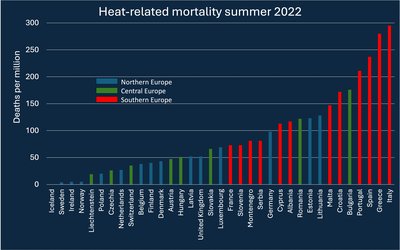
Current situation
It is likely that climate change has already increased the health risks of heat stress, air quality and a number of diseases, globally, a recent literature survey has shown. Recent climate change has likely increased risks from undetectable to moderate for heat-related morbidity and mortality, ozone-related mortality, dengue, and Lyme disease. Recent climate change also may begin to increase incidences of West Nile fever. The impact of climate change on malaria hasn’t been detected yet, but this is probably just a matter of time.
Future projection
These health risks are projected to increase globally with additional warming. Climate change is already causing additional deaths during heatwaves, and this risk is expected to transition to very high as temperatures rise to 3 °C or more, especially where high temperatures are accompanied by high humidity. Ozone-related mortality will follow a similar pattern to heat-related morbidity and mortality because ozone formation is temperature-sensitive. Overall, the risk of malaria is projected to increase with additional warming, but risk reduction may occur in some regions that become too hot and/or dry for the mosquito that spreads malaria. The latter may also be the case for dengue fever. Although the impact of climate change on malaria hasn’t been detected yet at the global scale, the impact could be evident within another half degree of warming and rise steadily with additional warming.
Start adapting now
The authors of this study stress the importance to start adapting health systems in time. Delay in implementing needed measures means health authorities will have to address significantly higher risk levels as the climate continues to warm, they warn. At that time, adaptation may be too constrained or too late.
Source: Ebi et al., 2021. Environmental Research Letters 16.








